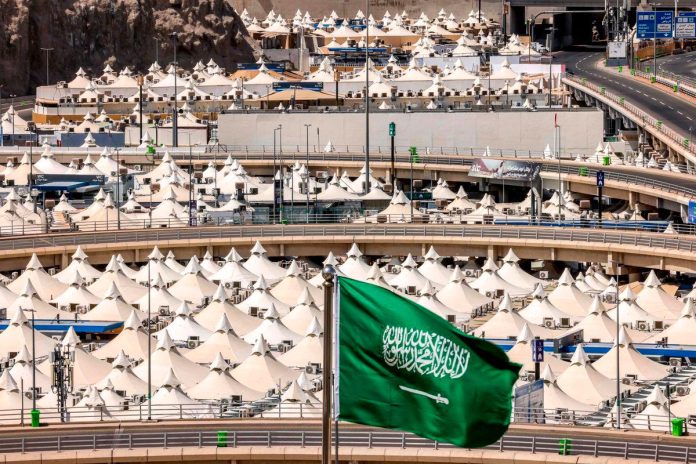MAKKAH: The Health Emergency Operations Centre of the Saudi Ministry of Health has dramatically reduced the time required to deliver medications across Hajj sites from over an hour to just six minutes, thanks to the use of drones.
This innovation marks a significant step forward in improving healthcare logistics and ensuring timely medical support for millions of pilgrims.
Previously, delivering medication to specific Hajj locations could take up to one hour and twenty minutes. By deploying drones this year, the ministry has reduced this time to just six minutes.
“This technological advancement is a game-changer,” said Chief Executive Officer of Saudi Medical Appointments & Referrals Centre, Prof Dr Nawfal Aljerian, during a foreign media visit to the Centre at Mina on Sunday, highlighting how the initiative aligns with the kingdom’s commitment to enhancing healthcare services during one of the world’s largest annual gatherings.
The Health Emergency Operations Centre functions 24/7 and integrates real-time data from multiple hospitals, clinics, and ambulance services.
All information flows in real time through electronic systems such as Electronic Medical Records (EMR) and Hospital Information Systems (HIS), allowing healthcare teams to make swift, informed decisions.
“This is an all-digital, fully integrated system,” explained Dr Nawfal.
“Every service provider, from the Ministry of Health to the Red Crescent Authority to private healthcare partners, is linked. Having everyone in the same room at the same time ensures coordinated decision-making and rapid responses.”
As of June 1, the ministry reported that more than 81,000 healthcare services had been delivered to pilgrims since the beginning of the Hajj season for the year 1446 AH.
The Health Emergency Operations Centre also supports public health monitoring, risk assessment, and rapid escalation when needed.
In addition, pilgrims can call the 97 local number for health-related queries, where they will be connected directly to the most suitable service.
The Unified Security Operations Centre (911), which works closely with the ministry, answers calls in under two seconds and relays reports to specialised teams within 45 seconds.
The system can handle calls in nearly all global languages, ensuring that every pilgrim, regardless of nationality, receives the support they need.
As the temperature rises during Hajj, health officials are urging pilgrims to take precautions against heat-related illnesses.
“My advice to all pilgrims is: rest when you can, stay out of direct sunlight, use umbrellas, drink plenty of water.. and enjoy your Hajj,” said Dr Nawfal.
This comprehensive and well-coordinated effort, led by the Ministry of Health, aims to ensure pilgrims’ access to high-quality medical care, strengthen the readiness of preventive and rapid response systems, and safeguard the health and safety of all pilgrims.
These services are part of the kingdom’s broader health vision under the Health Sector Transformation Programme and the Pilgrim Experience Programme – two key initiatives stemming from Saudi Vision 2030.
These initiatives aim to provide exceptional healthcare that ensures the well-being and comfort of pilgrims as they perform their religious duties safely and with ease.
Data released by the Ministry of Health indicates that nearly 49,000 pilgrims have received care at primary healthcare centres, while emergency departments have handled over 19,000 cases.
Outpatient clinics have received nearly 1,000 patients, and more than 3,500 individuals have been admitted to hospitals, including 1,730 to intensive care units.
In addition, the healthcare system has successfully handled 120 cardiac catheterisation procedures and 11 open-heart surgeries.
Meanwhile, field medical teams have responded swiftly and efficiently to 25 cases of heat exhaustion.
The healthcare system continues to operate at full capacity, guided by proactive planning and a fully integrated network of high-quality services.
With the integration of drones, AI-powered decision-making, and 24-hour service, Saudi Arabia’s health and security teams are demonstrating a new level of preparedness and innovation to safeguard the health and safety of the Guests of the Merciful.








